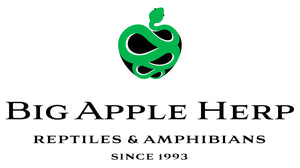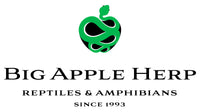Care Sheet for Russian Tortoise
One of the most popular tortoise species available, the Russian tortoise appeals to new tortoise-keepers and seasoned veterans alike. Originating from Russia, Ukraine, Pakistan and Western China, this small species makes an ideal pet for people with limited space. Russian Tortoises have a hearty appetite and are often more active than other tortoises. A friendly species, they do well in small groups, but should not be over-handled as this can cause them stress. At Big Apple Pet Supply, baby Russian Tortoises are bred in house. Average Adult Size: 5”-6” Life Span: Up to 40+ years
Housing
Adult Russian Tortoises can be housed in a variety of enclosures but should be provided no less than 5 square feet, with sidewalls 8 inches or higher. Easy options for perfect housing are the Happy Home Terrarium for Box Turtles & Tortoises or Zoo Med Tortoise House, or a larger enclosure such as the Big Apple Tortoise & Box Turtle Home. This species also likes to spend time outdoors which is an excellent way to offer natural sunlight and grazing opportunities. You can safely house your tortoise outdoors in the Zoo Med Tortoise Play Pen.
Substrate
Russian Tortoises live in arid environments in the wild and should be provided a dry habitat. Do not allow your tortoise to stay on a wet substrate. Russian Tortoises like to burrow and should be provided 3”+ of substrate for burrowing. Mixed substrates of Zoo Med Eco Earth Loose Coconut Fiber Substrate and Zoo Med Repti Sand provide for appropriate bedding and burrowing needs.
Heating
Russian Tortoises are kept comfortable and will be most active in a habitat offering a range of temperatures between 60° to 90° Fahrenheit. The heated side should be no more than 100° Fahrenheit and should include a burrowing area. Russian Tortoises do not need to hibernate to be healthy, they just require a stable temperature range. Heating elements should be kept on 12 to 14 hours per day and turned off at night to create an optimum environment. The Happy Home Terrarium Add-On Kit contains all the necessary heating fixtures for your Russian Tortoise.
Lighting
Russian Tortoises require UVB lighting for 10-12 hours per day (turned off at night) in order to process calcium and synthesize Vitamin D3. Without proper UVB lighting, serious health problems such as abnormal shell growth and deformities may occur. A 160 watt bulb at a MINIMUM distance setting of 18" will produce approximately 150-200 microwatts per square centimeter (uW/cm2) of UVB and 900-1200uW/cm2 of UVA. MAXIMUM distance setting of 24" will produce 50-75 microwatts per square centimeter (uW/cm2) of UVB. (Distance is measured from lamp face to basking spot or reptile for optimum UVB and heat.) The Happy Home Terrarium Add-On Kit contains all the necessary lighting fixtures for your Russian Tortoise.
Shelter
Russian tortoises are burrowers and like to dig (see SUBSTRATE, above). You should also provide a hide box such as Zoo Med Hiding Hut Ceramics or the beautiful Hand-Carved Authentic Java Wood Reptile Hideouts. Add a few flat rocks for climbing and you’ll have all the comforts your Russian Tortoise requires.
Water
Always provide clean drinking and soaking water for your Russian Tortoise and keep the area around the water bowl dry. A large bowl with a ramp or terraced edge allows an opportunity for climbing and easy access to water. Extra-large sizes are excellent for tortoises. If you are concerned about dehydration, you can soak your Russian Tortoise in a shallow water container outside its habitat once or twice a week for 15 to 30 minutes.
Food
Russian Tortoises are serious eaters and require a high fiber, low protein diet. Zoo Med Natural Tortoise Foods Grassland Formulation is perfect for Russian Tortoises and should be incorporated into their diet. They will eat almost any leafy greens or vegetables offered to them. Provide a wide variety of greens such as kale, collard greens, turnip greens and any of the darker lettuce types; clover, hibiscus leaves and flowers, alfalfa and hay may also be provided. Variety is the key but DO NOT feed your Russian Tortoise fruits as the fruit sugars may cause health problems.
Vitamins
Part of a healthy diet for your Russian Tortoise is maintaining proper calcium levels to promote shell growth and egg development. Calcium “bones”supplements, such as Zoo Med Turtle Cuttlebones, are a natural calcium source for all types of tortoises. The rough, edible surface prevents overgrown mandibles (beaks) and helps curb unwanted chewing behavior.
Cage Maintenance
Russian Tortoises require cleaning of feces or urine soaked substrates daily. Scoops are handy for this particularly on a sandy substrate. Water should be changed daily or more often if the animal defecates in the water dish. A full cleaning - replacement of substrate and wiping down the enclosure - is recommended no less than once every couple weeks. Use a mild cleaner, such as Quat TB Pet Area Cleaner, Deodorizer & Stain Remover, to safely clean your enclosure.
Hibernation
Russian Tortoises in the wild may hibernate for up to 9 months of the year. However, they do not need to hibernate to be healthy. Given a stable heating and lighting environment (as indicated above) your Russian Tortoise will be perfectly happy.

